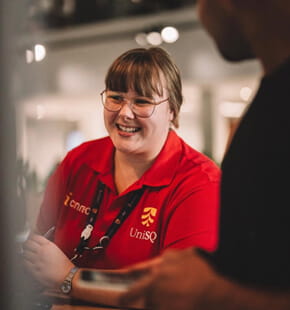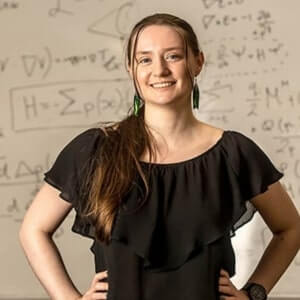Explore Mathematics and Statistics degrees
Undergraduate (your first degree)
An undergraduate degree is an academic program of study that leads to a qualification, such as an associate degree, diploma or bachelor's degree. It's typically the first degree you undertake when entering university or an additional degree you can take on if changing your career path.
- Toowoomba
- External
- Feb, Jun, Sep
- Springfield
- Toowoomba
- Online
- Feb, Jun, Sep
- Toowoomba
- External
- Online
- Feb, Jun, Sep
Postgraduate (further study)
A postgraduate degree is an advanced qualification pursued after completing an undergraduate degree or significant work experience. It includes master's degrees, as well as postgraduate diplomas and certificates.
- Toowoomba
- External
- Online
- Feb, Jun, Sep
- Ipswich
- Toowoomba
- External
- Online
- Feb, Jun
- Ipswich
- Toowoomba
- External
- Online
- Feb, Jun, Sep
Research (higher degrees by research)
Research degrees are master's or doctorate/doctoral programs centred on in-depth study within a specific field, allowing you to conduct highly specialised research under the guidance of expert supervisors.
Frequently asked questions
A degree in mathematics focuses on the study of abstract mathematical concepts, theories, and principles. It covers topics such as algebra, calculus, geometry, number theory, and mathematical proofs.
A statistics degree focuses on the collection, analysis, interpretation, and presentation of data. It includes topics such as probability theory, statistical modelling, experimental design, and data analysis techniques. Our statistics and math courses at UniSQ are part of our Sciences and Agriculture study area and provide a comprehensive foundation in both pure mathematics and applied statistics.
- Strong analytical and problem-solving abilities: Mathematics and statistics professionals must possess the capability to analyse complex problems, identify patterns, and develop innovative solutions using logical and systematic approaches.
- Proficiency in mathematical and statistical techniques: A solid understanding of mathematical concepts and statistical methods is crucial for conducting accurate data analysis, constructing models, and making informed decisions based on quantitative information.
- Critical thinking and logical reasoning: The ability to think critically, evaluate evidence, and apply logical reasoning.
- Attention to detail and accuracy in data analysis: Precise attention to detail ensures accurate data collection, proper application of statistical methodologies, and reliable interpretation of results, contributing to sound decision-making.
- Computational skills and familiarity with programming languages: Proficiency in programming languages such as R or Python enables efficient data manipulation, modelling, and simulation, supporting advanced data analysis and algorithm development.
- Ability to work with large datasets and apply appropriate statistical methods: Being skilled in handling and analysing large datasets, selecting suitable statistical techniques, and interpreting results allows professionals to draw meaningful insights and make evidence-based decisions.
Mathematics and statistics have a wide range of real-world applications. In fields such as finance, economics, engineering, data science, allied health, market research, and social sciences, mathematical and statistical methods are used to analyse data, make predictions, solve problems, and inform decision-making. They are also applied in areas like risk analysis, quality control, optimisation, cryptography, actuarial science, and scientific research.
By developing a strong foundation in mathematics and statistics, you can apply these disciplines to address real-world challenges and contribute to various industries and research fields.
A mathematics and statistics degree from UniSQ can lead to a range of career options, including:
- data analyst
- actuary
- financial analyst
- operations research analyst
- research scientist
- statistician
- quantitative analyst
- data scientist
- mathematics educator.
UniSQ understands the need for flexibility to balance your education with other commitments. We provide a range of study options, including on-campus, external, and online math courses which gives you the option to learn your subject theory where and when it suits you. As an external student, you’ll experience the same level of support and opportunity to connect with others.
You can also adjust your math degree enrolment to meet your needs. Take one subject at a time, or study extra subjects when life allows it.
A degree in mathematics and statistics at UniSQ provides a comprehensive understanding of mathematical concepts, statistical methods, and data analysis. When you study a mathematics degree or a degree in statistics at UniSQ, you will benefit from valuable opportunities for career advancement across diverse fields, practical relevance in today's data-driven world, and meaningful industry connections.
Our math courses focus on theoretical foundations and real-world applications, while our statistics major provide students with a solid grounding in statistical methodologies and data analysis techniques. By acquiring a strong foundation in mathematics and statistics at UniSQ, you can work on projects from developing financial market models, assessing product quality, analysing weather patterns, detecting diseases, or solving intricate security codes. The possibilities are endless at UniSQ.
Take your first step

UniSQ is collecting the personal information on this form for support for students and prospective students and for marketing purposes. By submitting this form, you consent to the terms of UniSQ's marketing privacy statement. Further information concerning privacy is available.
Welcome aboard! We've got your details.
Something doesn't look right. Try that one again.


